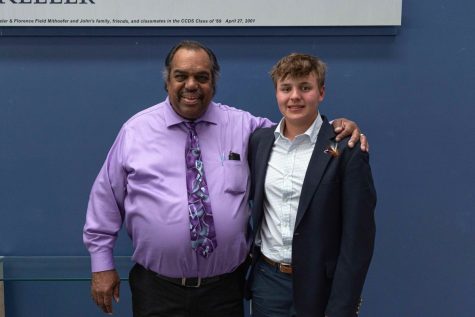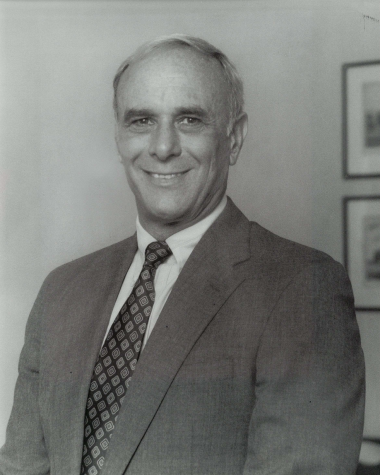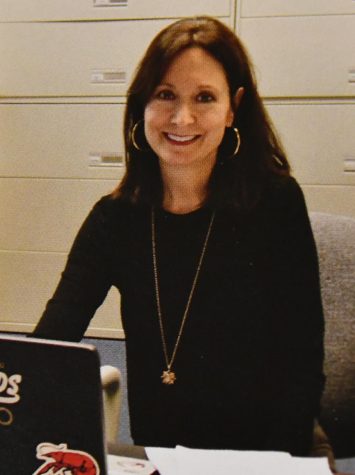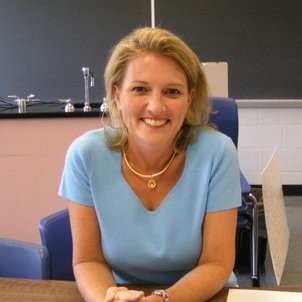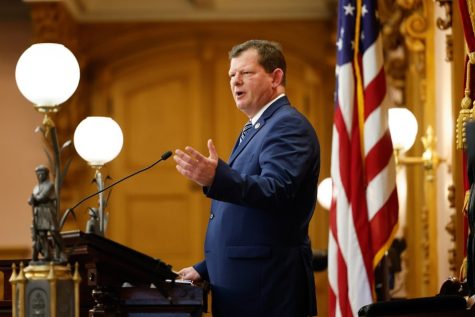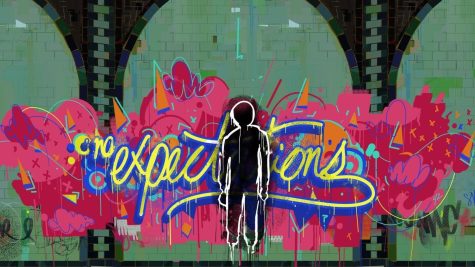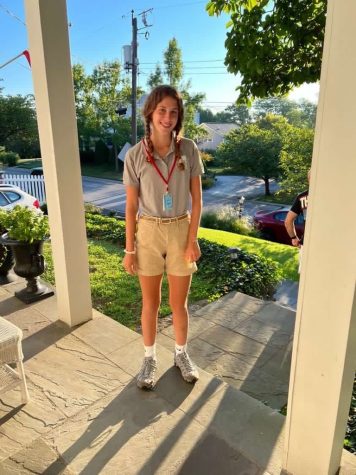Mr. Black Retires After Thirty-Five Years at Country Day
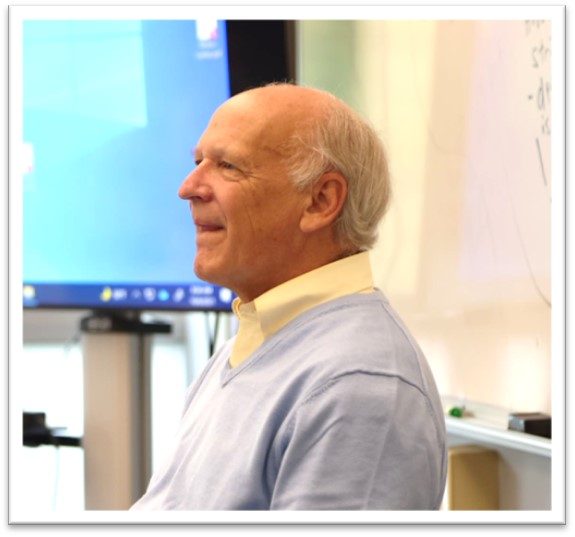
May 19, 2023
The 2022-2023 school year will be the last for the iconic Upper School history teacher Mr. Merle Black. Mr. Black has put in an astounding 35 years of service to Cincinnati Country Day as a history teacher, cross country and track coach, colleague, mentor, and friend. I recently had the chance to sit down with him to get his thoughts and reflections on his service at Country Day.
Mr. Black began his teaching career at Cheshire Academy in Connecticut in 1982. Later, after putting out his application to hundreds of schools across the country, Mr. Black was enticed by Country Day in 1988. Our late headmaster and close friend of Mr. Black’s, Mr. John Raushenbush, was Mr. Black’s first impression of the school. According to him, Mr. Raushenbush had “a sense of humor and a love of storytelling that I found irresistible. With the exception of graduate school in Chicago, I had lived my life in the Northeast. The prospect of Cincinnati and the Midwest did not appeal to me. That all changed after my interview with Mr. Raushenbush! One of my family’s greatest blessings is thirty-five years ago John Raushenbush interviewed me in Boston and invited me to come to Cincinnati to teach at Country Day.”
After arriving at Country Day, he jumped in head-first. Not only was he in charge of teaching a new history class, but he also took up the mantle of cross-country coach, a job he kept until retiring from coaching 2020 for 32 years.
When I asked him about why he’s stayed so long, he remarked that it was “The kids. There’s no question about it. I love the kids. They’re wonderful. I think they’re incredibly respectful. The kids are great and they’ve become better in terms of being accepting of one another.”
Those of us who have been fortunate enough to be in one of Mr. Black’s classes or electives can certainly attest to his dedication to us kids. The hours spent over the photocopier with hundreds of books is proof enough, no matter how many trees have been killed in the process!!
Speaking of the infamous ‘readings,’ I had to ask about a favorite one of his. “One has got to be Norbert Elias’s The Civilizing Process and the history of manners. Another one that, though I’ve moved away from it a little bit, I feel is very compelling and important is Günter Grass’s Peeling the Onion because it had much to do with the unexamined past, particularly if it’s a troubled past. It creates all kinds of problems for an individual, a society, and a nation.”
For my class and I, Peeling the Onion was the first major reading we were assigned. Daunting as it was, I remember being very enlightened as to its thoughts on history being able to exorcise old demons.
“And so I think that history, done properly, is therapeutic. That comes to me from having studied German history, with Günter Grass being particularly sensitive to the idea that Germany has to explore its troubled past in order to heal, as well as the past not being able to be redeemed, but that efforts have to be taken to see that nothing like that happens ever again.”
He added that, “that’s why the Gestapo headquarters, now the Topography of Terror, is the front of it. It’s all stone. Let no grass grow here. This is an open wound. That’s one way to exorcise the ghosts that continue to haunt us and hold a country like Germany back.”
He finished by adding that he thinks “Germany’s gone a long way. We have a way to go in this country to explore our troubled past and it’s now become a political hot potato in terms of studying the history of race in this country, which I think has to be explored – has to.”
I then asked about what he will miss most about teaching. “Again, it’s the students. What an incredible opportunity to sit down with young people. I think high school students’ minds are more open today than many college students. It has been such a wonderful opportunity to spend the day with young people who are interested in hearing a little bit of what you have to say and that together we can explore the great ideas and the great narrative of the human race of human civilization.”
Those great narratives of civilization have been central to Mr. Black’s curriculum throughout his 35 years. Whether it’s the origins of the Catholic Church, Medieval feudalist society, Hieronymus Bosch’s The Garden of Earthly Delights, the rise of Nazi Germany, life in a big city, or communist China’s mass surveillance system, Mr. Black has always kept a curious mind to somehow weave all of those, and many more events, together to better understand how we’ve gotten to where we’re at and where, as a species, we could be headed next.
“We ought to know what’s going on around us. It’s really interesting to me. Learning is fun and with that, I’ve never been a big proponent of grades. It should be more about, “Can we have some fun?”
There has undeniably been lots of that over the course of his many years. Mr. Black’s famous tales of his family, friends, college, athletic and teaching life have been well-received by so many of his students through all these years.
In his retirement, Mr. Black told me that he was planning to “spend as much time as our daughters want to see my wife and me.”
Another project that he will be tackling is attempting to sort through his legions of books. “I’ve got literally hundreds. I have a task that my wife has established for me to go through my collection of books. I’ve gotten rid of thousands, but I have well over 10,000 books at home. I’d like to go through them, organize them, and get rid of those that aren’t relevant anymore. Then, I have hundreds of books I’m really eager to start reading.”
He is also looking forward to spending time with his wife, Suzanne, of 41 years.
“There’s no one that I’d rather be with than her.”
He also plans to continue working on the famous literary masterpiece that we all know as The Black Book.
“I’m going to work on it, not with the idea of publishing it, but just to continue to work on it, because I find constantly improving it intellectually exciting and fun to do.”
I made sure to ask, however, if publishing The Black Book was not out of the question.
“Just working on this is gratifying enough. I have dreams, daydreams, maybe, that are incredibly ridiculous, about publishing it and becoming a bestseller, but those are just the daydreams that every person has, that they’re going to be the next Bob Gibson or strike out 20 batters.”
“Well, you don’t know until you try it, right?” I asked. “Why not be the next Bob Gibson?“
“Yeah, but I’m not really. I’ve had my opportunity to influence others. And boy, have they influenced me. It’s gone both ways. Have I learned from students? Have I learned from you? Absolutely, you know, absolutely.”
Speaking of influence, I also asked about what he would like his legacy at our school to be.
“Just that from Mr. Black it was all about the students. And I’m borrowing that from Tony Jaccaci, he said all the time that the only reason we’re here is for the students and again, what a great opportunity it has been. What an opportunity for teachers to spend their days reading about China and what’s going on in the Ukraine and if China is going to try to take Taiwan and to get students thinking about this. Because it’s going to be your responsibility to decide what to do about it. It’s just extraordinary. One of the things I wish for students and kids is to be more politically engaged. It is critical to know what the issues are.”
It’s hard to understate the contributions of Merle Black to both Cincinnati Country Day School and to the world. Through the thousands of hours he’s spent grading papers, leading discussions, and searching through thousands of books for interesting readings, he has undeniably enriched the lives of thousands of students.
I’ve often said that Mr. Black is the closest person I know to understanding the meaning of life, and that is no exaggeration. Such complicated topics as “who are we and why are we here?” have been welcomed and debated in his many classes. In the hallway, on the field, in the classroom, and anywhere else, Mr. Black has brought a youthful and inquisitive spirit and sense of humor that will be sorely missed on Country Day’s campus. His tireless efforts to send forth not just good students, but good human beings into the world will echo through generations to come.



